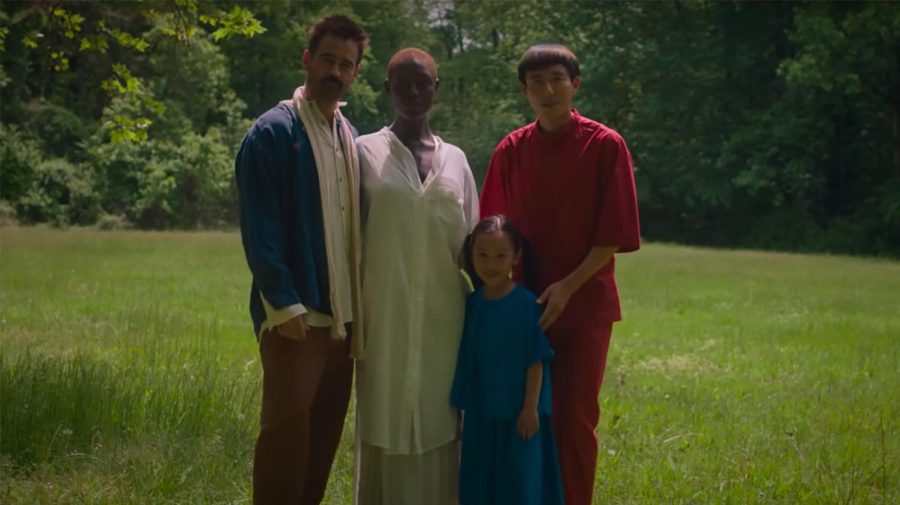“After Yang” is a touching and unique family drama woven in a science-fiction narrative. Directed by South Korean-both filmmaker Kogonada, the film was included within the Un Certain Regard category at Cannes last year, and is now on Showtime. The film plays with a lot of interesting ideas, among them are adoption, families, parenting, the humanity of androids and memory.
Jake (Colin Farrell) runs a tea shop, where his family thinks he spends too much time. He and a woman by the name of Kyra (Jodie Turner-Smith) live together with their adopted child Mika (Malea Emma Tjandrawidjaja) and her android older brother Yang (Justin H. Min). Kyra does not have much of a fully developed character, as the film focuses largely on Jake and Mika.
The film opens with a family picture being taken with Jake, Kyra and Mika standing together for the photo. Yang isn’t in the frame as he is setting up the shot, then he eventually gets into the frame for the picture.
Yang is part of the family. This is shown through his participation in family activities, such as him joining in on their dance competition against other families, after which he malfunctions. The family’s grief does not feel the same as if their son died, as there is maybe a possibility of fixing Yang.
As Jake runs to different places to try and get Yang fixed, the film shows how the society treats the androids much like our society treats cars. There are issues with buying one new versus used, or how one is allowed to repair the androids.
Mika misses Yang, and we find more out about her connection to Yang as the film progresses. Yang served as Mika’s older brother and was meant to teach her facts about China. To explain Mika’s status as an adopted child, Yang uses an analogy of grafting and explains how both of her family trees are important.
Justin H. Min’s performance as Yang is truly special. His ability to convey subtle emotion makes you question what the character is feeling, and more importantly, if the character can feel at all.
One of the most interesting ideas presented in the film, is how the parents are in some ways outsourcing caring for their child to Yang.
Before making feature films, Kogonada made several videos about film style and technique. His style established in “Columbus” is present here. Shots go on for a while with no camera movement and little to no cuts within scenes. However, variations are also used. Sometimes when the film shows character’s memories, a less polished style is used. There is camera movement, jump cuts as well as cuts between different angles. This provides a somewhat confusing feeling, similar to trying to remember events from one’s own memory. The techniques used also provide closer framing of the characters. The film also uses different aspect ratios, with a tighter aspect ratio used for video calls. I was confused the first time this happened and was not sure why aspect ratios changed, but later it clicked for me.
I found “Columbus” got a bit boring as opposed to “After Yang,” which I found to be a much better film, yet it also could be that I am becoming more used to the style. There are several directors for whom it took some time for me to become accustomed to their style. Some viewers may find the film too slow, lacking in any tumultuous scene, and low in tension. Yet, I was not bored.
The world is interesting and feels unique, but the film does not feel the need to explain all the lore of the world. The film does not say when it is set, it gives you about the bare minimum of what you need to know to understand the story. For instance, the film casually introduces clones and doesn’t go in depth about the backstory of the company producing android older siblings and the film’s society. People may get mad at a lack of explanation for many aspects of the fictional world, yet I am personally fine with it.
I have not found information on the film’s budget yet. Based off the film not having a wide release, I assume it is fairly small. The film gives a sense of a wider lived-in world and manages to do it effectively with its production scale. I do not remember any big landscape shots of the city.
The film is quiet and gentle. It does not give easy answers to the large questions it deals with. Though it may seem from this description like a film about grief, it is not bleak. The film takes the story of a person who should spend more time with his children but does it in an interesting way. At the film’s core, I think it is a family drama. The film values family in a meaningful and not sentimental way. I highly recommend this film to both fans of science fiction and family dramas. It is a great science fiction film that uses its setting to explore ideas about memory and family.
Scott Lerer can be reached at [email protected].



















